bill gates 哈佛演讲英文版.
比尔盖茨哈佛演讲中英文稿
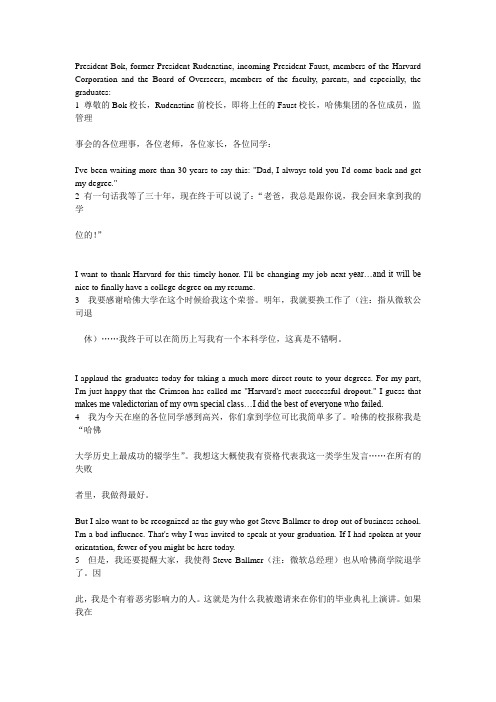
President Bok, former President Rudenstine, incoming President Faust, members of the Harvard Corporation and the Board of Overseers, members of the faculty, parents, and especially, the graduates:1 尊敬的Bok校长,Rudenstine前校长,即将上任的Faust校长,哈佛集团的各位成员,监管理事会的各位理事,各位老师,各位家长,各位同学:I've been waiting more than 30 years to say this: "Dad, I always told you I'd come back and get my degree."2 有一句话我等了三十年,现在终于可以说了:“老爸,我总是跟你说,我会回来拿到我的学位的!”I want to thank Harvard for this timely honor. I'll be changing my job next y ear…and it will be nice to finally have a college degree on my resume.3 我要感谢哈佛大学在这个时候给我这个荣誉。
明年,我就要换工作了(注:指从微软公司退休)……我终于可以在简历上写我有一个本科学位,这真是不错啊。
I applaud the graduates today for taking a much more direct route to your degrees. For my part, I'm just happy that the Crimson has called me "Harvard's most successful dropout." I guess that makes me valedictorian of my own special class…I did the best of everyone who failed.4 我为今天在座的各位同学感到高兴,你们拿到学位可比我简单多了。
比尔盖茨在哈佛大学的演讲(双语版)
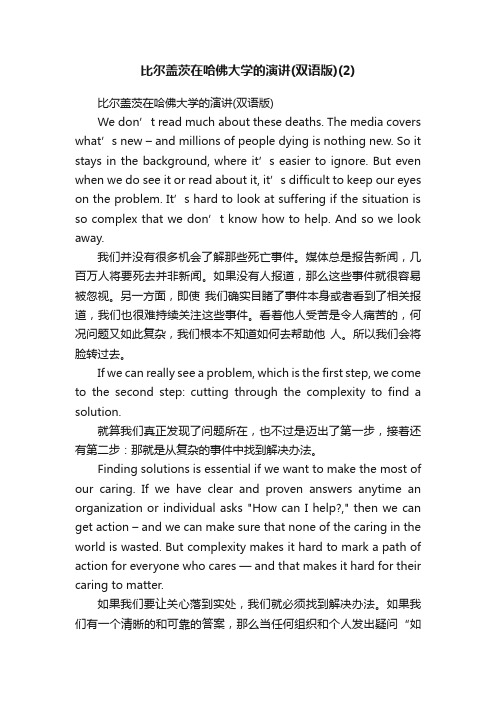
比尔盖茨在哈佛大学的演讲(双语版)(2)比尔盖茨在哈佛大学的演讲(双语版)We don’t read much about these deaths. The media covers what’s new – and millions of people dying is nothing new. So it stays in the background, where it’s easier to ignore. But even when we do see it or read about it, it’s difficult to keep our eyes on th e problem. It’s hard to look at suffering if the situation is so complex that we don’t know how to help. And so we look away.我们并没有很多机会了解那些死亡事件。
媒体总是报告新闻,几百万人将要死去并非新闻。
如果没有人报道,那么这些事件就很容易被忽视。
另一方面,即使我们确实目睹了事件本身或者看到了相关报道,我们也很难持续关注这些事件。
看着他人受苦是令人痛苦的,何况问题又如此复杂,我们根本不知道如何去帮助他人。
所以我们会将脸转过去。
If we can really see a problem, which is the first step, we come to the second step: cutting through the complexity to find a solution.就算我们真正发现了问题所在,也不过是迈出了第一步,接着还有第二步:那就是从复杂的事件中找到解决办法。
Finding solutions is essential if we want to make the most of our caring. If we have clear and proven answers anytime an organization or individual asks "How can I help?," then we can get action – and we can make sure that none of the caring in the world is wasted. But complexity makes it hard to mark a path of action for everyone who cares — and that makes it hard for their caring to matter.如果我们要让关心落到实处,我们就必须找到解决办法。
英语演讲稿——比尔·盖茨(精选多篇)
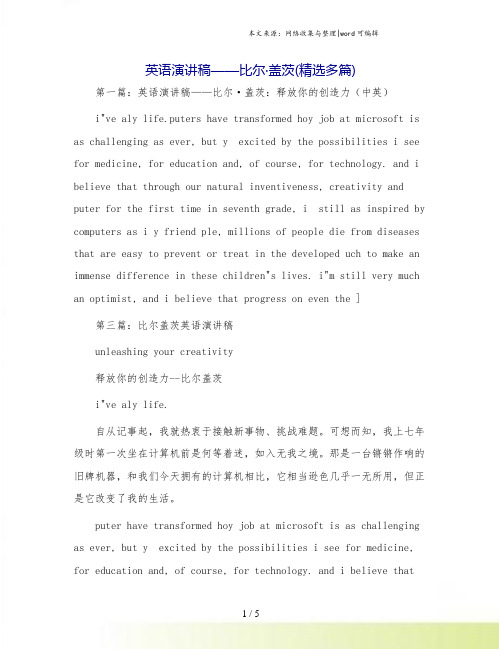
英语演讲稿——比尔·盖茨(精选多篇)第一篇:英语演讲稿——比尔·盖茨:释放你的创造力(中英)i"ve aly life.puters have transformed hoy job at microsoft is as challenging as ever, but y excited by the possibilities i see for medicine, for education and, of course, for technology. and i believe that through our natural inventiveness, creativity and puter for the first time in seventh grade, i still as inspired by computers as i y friend ple, millions of people die from diseases that are easy to prevent or treat in the developed uch to make an immense difference in these children"s lives. i"m still very much an optimist, and i believe that progress on even the ] 第三篇:比尔盖茨英语演讲稿unleashing your creativity释放你的创造力--比尔盖茨i"ve aly life.自从记事起,我就热衷于接触新事物、挑战难题。
可想而知,我上七年级时第一次坐在计算机前是何等着迷,如入无我之境。
那是一台锵锵作响的旧牌机器,和我们今天拥有的计算机相比,它相当逊色几乎一无所用,但正是它改变了我的生活。
比尔盖茨哈佛演讲稿

比尔盖茨哈佛演讲稿第一篇:比尔盖茨哈佛idn’t care, but because we didn’t know what to do. if we had known how to help, we would have acted.此刻在这个院子里的所有人,生命中总有这样或那样的时刻,目睹人类的悲剧,感到万分伤心。
但是我们什么也没做,并非我们无动于衷,而是因为我们不知道做什么和怎么做。
如果我们知道如何做是有效的,那么我们就会采取行动。
the barrier to change is not too little caring; it is too much complexity.改变世界的阻碍,并非人类的冷漠,而是世界实在太复杂。
to turn caring into action, we need to see a problem, see a solution, and see the impact. but complexity blocks all three steps.为了将关心转变为行动,我们需要找到问题,发现解决办法的方法,评估后果。
但是世界的复杂性使得所有这些步骤都难于做到。
even with the advent of the internet and 24-hour news, it is still a complex enterprise to get people to truly see the problems. when an airplane crashes, officials immediately call a press conference. they promise to investigate, determine the cause, and prevent similar crashes in the future.即使有了互联网和24小时直播的新闻台,让人们真正发现问题所在,仍然十分困难。
比尔·盖茨哈佛大学毕业典礼演讲

比尔·盖茨哈佛大学毕业典礼演讲以下是一篇“比尔·盖茨哈佛大学毕业典礼演讲”,供大家浏览。
membersoftheharvardfamily:哈佛是一个大家庭。
hereintheyardisoneofthegreatcollectionsofintellectualtalenti ntheworld.这个院子里在场的人们,是全世界最有智力的人类群体之一。
forwhatpurpose?我们可以做些什么?thereisnoquestionthatthefaculty,thealumni,thestudents,andt hebenefactorsofharvardhaveusedtheirpowertoimprovetheliveso fpeoplehereandaroundtheworld.毫无疑问,哈佛的老师、校友、学生和资助者,已经用他们的能力改善了全世界各地人们的生活。
butcanwedomore?但是,我们还能够再做什么呢?canharvarddedicateitsintellecttoimprovingthelivesofpeople whowillneverevenhearitsname?有没有可能,哈佛的人们可以将他们的智慧,用来帮助那些甚至从来没有听到过“哈佛”这个名字的人?letmemakearequestofthedeansandtheprofessors-theintellectualleadershereatharvard:请允许我向各位院长和教授,提出一个请求:asyouhirenewfaculty,awardtenure,reviewcurriculum,anddete rminedegreerequirements,pleaseaskyourselves:你们是哈佛的智力领袖,当你们雇用新的老师、授予终身教职、评估课程、决定学位颁发标准的时候,请问你们自己如下的问题:shouldourbestmindsbededicatedtosolvingourbiggestproble ms?我们最优秀的人才是否在致力于解决我们最大的问题?shouldharvardencourageitsfacultytotakeontheworld'sworsti nequities?哈佛是否鼓励她的老师去研究解决世界上最严重的不平等?shouldharvardstudentslearnaboutthedepthofglobalpoverty …哈佛的学生是否从全球那些极端的贫穷中学到了什么…theprenceofworldhunger…世界*的饥荒…thescarcityofcleanwater…清洁的水资源的缺乏…thegirlskeptoutofschool…无法上学的女童…thechildrenwhodiefromdiseaseswecancure?死于非恶*疾病的儿童…shouldtheworld'smostprivilegedpeoplelearnaboutthelivesof theworld'sleastprivileged?那些世界上过着最优越生活的人们,有没有从那些最困难的人们身上学到东西?thesearenotrhetoricalquestions-youwillanswerwithyourpolicies.这些问题并非语言上的修辞。
比尔·盖茨在哈佛大学毕业典礼上的演讲
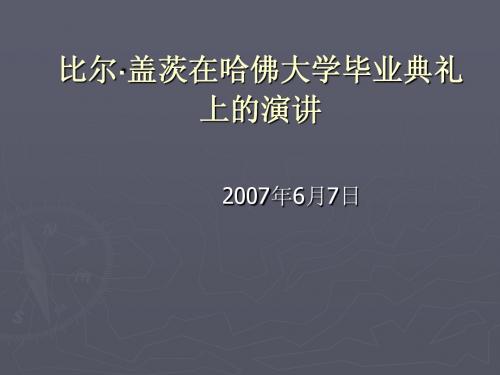
►I
believe we have more caring than we know what to do with.
► All
of us here in this Yard, at one time or another, have seen human tragedies that broke our hearts, and yet we did nothing – not because we didn't care, but because we didn't know what to do. If we had known how to help, we would have acted.
► 如果我们能够找到这样一种方法,既可以帮
到穷人,又可以为商人带来利润,为政治家 带来选票,那么我们就找到了一种减少世界 性不平等的可持续的发展道路。这个任务是 无限的。它不可能被完全完成,但是任何自 觉地解决这个问题的尝试,都将会改变这个 世界。
►I
am optimistic that we can do this, but I talk to skeptics who claim there is no hope. They say: "Inequity has been with us since the beginning, and will be with us till the end – because people just … don't … care." I completely disagree. ► 在这个问题上,我是乐观的。但是,我也遇 到过那些感到绝望的怀疑主义者。他们说: “不平等从人类诞生的第一天就存在,到人 类灭亡的最后一天也将存在。——因为人类 类灭亡的最后一天也将存在。——因为人类 对这个问题根本不在乎。” 对这个问题根本不在乎。”我完全不能同意 这种观点。
比尔盖茨在哈佛大学毕业典礼上的演讲稿_毕业典礼发言稿
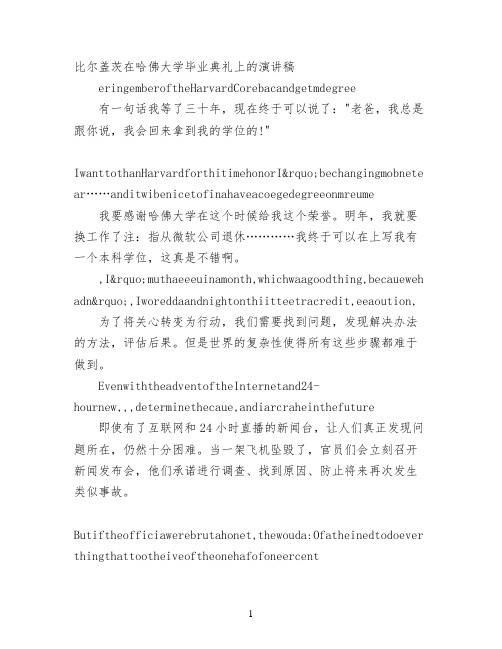
比尔盖茨在哈佛大学毕业典礼上的演讲稿eringemberoftheHarvardCorebacandgetmdegree有一句话我等了三十年,现在终于可以说了:"老爸,我总是跟你说,我会回来拿到我的学位的!"IwanttothanHarvardforthitimehonorI&rquo;bechangingmobnete ar……anditwibenicetofinahaveacoegedegreeonmreume 我要感谢哈佛大学在这个时候给我这个荣誉。
明年,我就要换工作了注:指从微软公司退休…………我终于可以在上写我有一个本科学位,这真是不错啊。
,I&rquo;muthaeeeuinamonth,whichwaagoodthing,becaueweh adn&rquo;,Iworeddaandnightonthiitteetracredit,eeaoution,为了将关心转变为行动,我们需要找到问题,发现解决办法的方法,评估后果。
但是世界的复杂性使得所有这些步骤都难于做到。
EvenwiththeadventoftheInternetand24-hournew,,,determinethecaue,andiarcraheinthefuture 即使有了互联网和24小时直播的新闻台,让人们真正发现问题所在,仍然十分困难。
当一架飞机坠毁了,官员们会立刻召开新闻发布会,他们承诺进行调查、找到原因、防止将来再次发生类似事故。
Butiftheofficiawerebrutahonet,thewouda:Ofatheinedtodoever thingthattootheiveoftheonehafofoneercent但是如果那些官员敢说真话,他们就会说:"在今天这一天,全世界所有可以避免的死亡之中,只有05%的死者来自于这次空难。
我们决心尽一切努力,调查这个05%的死亡原因。
比尔·盖茨在哈佛大学毕业典礼上的演讲(中英文对照)[精选5篇]
![比尔·盖茨在哈佛大学毕业典礼上的演讲(中英文对照)[精选5篇]](https://img.taocdn.com/s3/m/bfeec3f05122aaea998fcc22bcd126fff7055ddb.png)
比尔·盖茨在哈佛大学毕业典礼上的演讲(中英文对照)[精选5篇]第一篇:比尔·盖茨在哈佛大学毕业典礼上的演讲(中英文对照) 比尔·盖茨和夫人梅琳达·盖茨在斯坦福大学2014年毕业典礼上的演讲。
整个演讲以“乐观”为主线,强调了他们对科技的乐观态度,以及对世界美好未来的乐观态度。
盖茨夫妇轮流讲述了自己的亲身经历和故事,告诉学生应该站在他人的立场上,感同身受那些处境不及自己的人,尽自己所能去帮助那些需要帮助的人,让全世界所有人类同胞都有一样的美好未来。
Stanford University.(斯坦福大学)BILL GATES: Congratulations, class of 2014!比尔·盖茨:2014届毕业生,祝贺你们顺利毕业(Cheers).(欢呼)Melinda and I are excited to be here.It would be a thrill for anyone to be invited to speak at a Stanford commencement, but it's especially gratifying for us.Stanford is rapidly becoming the favorite university for members of our family, and it's long been a favorite university for Microsoft and our foundation.我和梅琳达怀着激动的心情与你们欢聚在此共贺毕业。
能受邀到斯坦福大学学位授予典礼上做演讲是一件让人激动的事,对我们而言,这尤为荣幸。
斯坦福大学正日渐成为我们家庭成员最喜爱的大学。
而长久以来,斯坦福也是微软以及比尔与梅琳达基金会最喜爱的一所大学。
”Our formula has been to get the smartest, most creative people working on the most important problems.It turns out that a disproportionate number of those people are at Stanford.(Cheers).我们一直致力于让最聪颖有创造力的人攻克最为重要的问题。
比尔盖茨在哈佛大学演讲(中英对照版)

call from Currier House to a company in Albuquer que that had begun making the world's first personal computer s. I offered to sell them software .
我在哈佛 最难忘的 回忆之 一,发生 在1975年 1月。那 时,我从 宿舍楼里 给位于 Albuquer que的一 家公司打 了一个电 话,那家 公司已经 在着手制 造世界上 第一台个 人电脑。 我提出想 向他们出 售软件。
friendsh ips I made, and the ideas I worked on.
不管怎 样,我对 哈佛的回 忆主要都 与充沛的 精力和智 力活动有 关。哈佛 的生活令 人愉快, 也令人感 到有压 力,有时 甚至会感 到泄气, 但永远充 满了挑战 性。生活 在哈佛是 一种吸引 人的特殊 待遇…… 虽然我离 开得比较 早,但是 我在这里 的经历、 在这里结 识的朋友
我为今天 在座的各 位同学感 到高兴, 你们拿到 学位可比 我简单多 了。哈佛 的校报称 我是“哈 佛大学历 史上最成 功的辍学 生”。我 想这大概 使我有资 格代表我 这一类学 生发言… …在所有 的失败者 里,我做 得最好。
But I also want to be recogniz ed as the guy who got Steve Ballmer to drop out of business school. I'm a bad influenc e. That's why I was invited to
But taking a serious look back … I do have one big regret.
比尔盖茨在哈佛大学毕业典礼上的演讲稿

比尔盖茨在哈佛大学毕业典礼上的演讲稿President Bok, former President Rudenstine, incoming President Faust, members of the Harvard Corporation and the Board of Overseers, members of the faculty, parents, and especially, the graduates:尊敬的Bok 校长,Rudenstine 前校长,即将上任的Faust 校长,哈佛集团的各位成员,监管理事会的各位理事,各位老师,各位家长,各位同学:I我终于可以在简历上写我有一个本科学位,这真是不错啊。
I applaud the graduates today for taking a much more direct route to your degrees. For my part, I在所有的失败者里,我做得最好。
But I also want to be recognized as the guy who got Steve Ballmer to drop out of business school. I虽然我离开得比较早,但是我在这里的经历、在这里结识的朋友、在这里发展起来的一些想法,永远地改变了我。
But taking a serious look back 民主制度、健全的公共教育体系、高质量的医疗保健、还是广泛的经济机会减少不平等始终是人类最大的成就。
I left campus knowing little about the millions of young people cheated out of educational opportunities here in this country. And I knew nothing about the millions of people living in unspeakable poverty and disease in developing countries.我离开校园的时候,根本不知道在这个国家里,有几百万的年轻人无法获得接受教育的机会。
最新整理比尔盖茨在哈佛大学的演讲(双语版)

比尔盖茨在哈佛大学的演讲(双语版)比尔盖茨在哈佛大学做什么演讲?具体的演讲内容是什么?下面学习啦小编分享了比尔盖茨在哈佛大学的演讲(双语版),希望你喜欢。
比尔盖茨在哈佛大学的演讲全文如下(双语版)P r e s i d e n t B o k,f o r m e r P r e s i d e n t R u d e n s t i n e,i n c o m i n g P r e s i d e n t F a u s t,m e m b e r s o f t h e H a r v a r d C o r p o r a t i o n a n d t h e B o a r d o f O v e r s e e r s, m e m b e r s o f t h e f a c u l t y,p a r e n t s,a n d e s p e c i a l l y,t h eg r a d u a t e s:尊敬的B o k校长,R u d e n s t i n e前校长,即将上任的F a u s t校长,哈佛集团的各位成员,监管理事会的各位理事,各位老师,各位家长,各位同学:I v e b e e n w a i t i n g m o r e t h a n 30 y e a r s t o s a y t h i s: D a d,I a l w a y s t o l d y o u I d c o m e b a c k a n d g e t m yd e g r e e.有一句话我等了三十年,现在终于可以说了:老爸,我总是跟你说,我会回来拿到我的学位的!I w a n t t o t h a n k H a r v a r d f o r t h i s t i m e l y h o n o r.I l l b e c h a n g i n g m y j o b n e x t y e a r a n d i t w i l l b e n i c e t o f i n a l l y h a v e a c o l l e g e d e g r e e o n m y r e s u m e.我要感谢哈佛大学在这个时候给我这个荣誉。
bill gates 哈佛演讲英文版

Bill Gates: Harvard Commencement SpeechAfter a 33 year leave of absence from his alma mate1r I’m pleased to present to you Dr. William Gates.Thank you. President Bok, former President Rudenstine, incoming President Faust, members of the Harvard Corporation and the Board of Overseers, members of the faculty, parents, and especially, the graduates:I've been waiting more than 30 years to say this: "Dad, I always told you I'd come back and get my degree."I want to thank Harvard for this honor. I'll be ch anging my job next year … and it will be nice to finally have a college degree on my resume.I applaud the graduates today for taking a much more direct route to your degrees. For my part, I'm just happy that the Crimson2has called me "Harvard's most successful dropout." I guess that makes me valedictorian3of my own special class … I did the best of everyone who failed.But I also want to be recognized as the guy who got Steve Ballmer to drop out of business school. I'm a bad influence. That's why I was invited to speak at your graduation. If I had spoken at your orientation, fewer of you might be here today.Harvard was just a phenomenal4experience for me. Academic life was fascinating. I used to sit in on lots of classes I hadn't even signed up for. And dorm life was terrific. I lived up at Radcliffe, in Currier5 House. There were always lots of people in my dorm room late at night discussing things, because everyone knew that I didn't worry about getting up in the morning. That's how I came to be the leader of the anti-social group. We clung to each other as a way of validating6our rejection of all those social people.Radcliffe was a great place to live. There were more women up there, and most of the guys were math-science types. That combination offered me the best odds, if you know what I mean. This is where I learned the sad lesson that improving your odds doesn't guarantee success.One of my biggest memories of Harvard came in January 1975, when I made a call from Currier House to a company in Albuquerque7that had begun making the world's first personal computers. I offered to sell them software.I worried that they would realize I was just a student in a dorm and hang up on me. Instead they said: 1母校2Crimson ['krimzn] n. 深红色这里指哈佛大学学生校报3valedictorian [.vælidik'tɔ:riən] n. 致告别辞者, 告别演说者4phenomenal [fi'nɔminl] exceedingly or unbelievably great 同义词:fantastic 很棒的5Currier ['kʌriə; 'kɜ:r-]6validate ['vælideit] vt. 使...有效, 确认,宣布有效declare or make legally valid7Albuquerque ['ælbəkə:ki] n. 1. 阿尔布开克(美国新墨西哥州中部一城市);"We're not quite ready, come see us in a month," which was a good thing, because we hadn't written the software yet. From that moment, I worked day and night on this little extra credit project that marked the end of my college education and the beginning of a remarkable journey with Microsoft.What I remember above all about Harvard was being in the midst of so much energy and intelligence. It could be exhilarating, intimidating, sometimes even discouraging, but always challenging. It was an amazing privilege – and though I left early, I was transformed by my years at Harvard, the friendships I made, and the ideas I worked on.But taking a serious look back … I do have one big regret.I left Harvard with no real awareness of the awful inequities8in the world – the appalling disparities9 of health, and wealth, and opportunity that condemn10millions of people to lives of despair.I learned a lot here at Harvard about new ideas in economics and politics. I got great exposure to the advances being made in the sciences.But humanity's greatest advances are not in its discoveries – but in how those discoveries are applied to reduce inequity. Whether through democracy, strong public education, quality health care, or broad economic opportunity – reducing inequity is the highest human achievement.I left campus knowing little about the millions of young people cheated out of educational opportunities here in this country. And I knew nothing about the millions of people living in unspeakable poverty and disease in developing countries.It took me decades to find out.You graduates came to Harvard at a different time. You know more about the world's inequities than the classes that came before. In your years here, I hope you've had a chance to think about how – in this age of accelerating technology – we can finally take on these inequities, and we can solve them.Imagine, just for the sake of discussion, that you had a few hours a week and a few dollars a month to donate to a cause – and you wanted to spend that time and money where it would have the greatest impact in saving and improving lives. Where would you spend it?For Melinda and for me, the challenge is the same: how can we do the most good for the greatest number with the resources we have.During our discussions on this question, Melinda and I read an article about the millions of children who were dying every year in poor countries from diseases that we had long ago made harmless in this8inequity [in'ekwiti] n. 不公平, 不公正9disparity [dis'pæriti] n. 不一致,差距,不平等10condemn [kən'dem] v. compel or force into a particular state or activity 被迫处于某种状态country. Measles11, malaria12, pneumonia, hepatitis13B, yellow fever. One disease I had never heard of, rotavirus14, was killing half a million kids each year – none of them in the United States.We were shocked. We had just assumed that if millions of children were dying and they could be saved, the world would make it a priority to discover and deliver the medicines to save them. But it did not. For under a dollar, there were interventions that could save lives that just weren't being delivered.If you believe that every life has equal value, it's revolting15to learn that some lives are seen as worth saving and others are not. We said to ourselves: "This can't be true. But if it is true, it deserves to be the priority of our giving."So we began our work in the same way anyone here would begin it. We asked: "How could the world let these children die?"The answer is simple, and harsh. The market did not reward saving the lives of these children, and governments did not subsidize it. So the children died because their mothers and their fathers had no power in the market and no voice in the system.But you and I have both.We can make market forces work better for the poor if we can develop a more creative capitalism – if we can stretch the reach of market forces so that more people can make a profit, or at least make a living, serving people who are suffering from the worst inequities. We also can press governments around the world to spend taxpayer money in ways that better reflect the values of the people who pay the taxes.If we can find approaches that meet the needs of the poor in ways that generate profits for business and votes for politicians, we will have found a sustainable way to reduce inequity in the world. This task is open-ended. It can never be finished. But a conscious effort to answer this challenge can change the world.I am optimistic that we can do this, but I talk to skeptics who claim there is no hope. They say: "Inequity has been with us since the beginning, and will be with us till the end –because people just … don't … care." I completely disagree.I believe we have more caring than we know what to do with.All of us here in this Yard, at one time or another, have seen human tragedies that broke our hearts, and yet we did nothing –not because we didn't care, but because we didn't know what to do. If we had known how to help, we would have acted.11measles ['mi:zlz] n. 麻疹12malaria [mə'lɛəriə] n. 疟疾13hepatitis [.hepə'taitis] n. 肝炎14rotavirus ['rəʊtə.vaiərəs] n.轮状病毒(一种致婴儿胃肠炎的病毒)15revolting [ri'vəultiŋ] adj. 讨厌的The barrier to change is not too little caring; it is too much complexity.To turn caring into action, we need to see a problem, see a solution, and see the impact. But complexity blocks all three steps.Even with the advent16of the Internet and 24-hour news, it is still a complex enterprise17to get people to truly see the problems. When an airplane crashes, officials immediately call a press conference. They promise to investigate, determine the cause, and prevent similar crashes in the future.But if the officials were brutally honest, they would say: "Of all the people in the world who died today from preventable causes, one half of one percent of them were on this plane. We're determined to do everything possible to solve the problem that took the lives of the one half of one percent."The bigger problem is not the plane crash, but the millions of preventable deaths.We don't read much about these deaths. The media covers what's new – and millions of people dying is nothing new. So it stays in the background, where it's easier to ignore. But even when we do see it or read about it, it's difficult to keep our eyes on the problem. It's hard to look at suffering if the situation is so complex that we don't know how to help. And so we look away.If we can really see a problem, which is the first step, we come to the second step: cutting through the complexity to find a solution.Finding solutions is essential if we want to make the most of our caring. If we have clear and proven answers anytime an organization or individual asks "How can I help?," then we can get action – and we can make sure that none of the caring in the world is wasted. But complexity makes it hard to mark a path of action for everyone who cares — and makes it hard for their caring to matter.Cutting through complexity to find solutions runs through four predictable stages: determine a goal, find the highest-impact approach, deliver the technology ideal for that approach, and in the meantime, use the best application of the technology you already have — whether it's something sophisticated18, like a new drug, or something simple, like a bednet19.16advent ['ædvənt] n. 出现, 到来17enterprise ['entəpraiz] 有意识的努力,决心18sophisticated [sə'fistikeitid] adj. 复杂的,精密的19蚊帐。
盖茨哈佛演讲精品文档
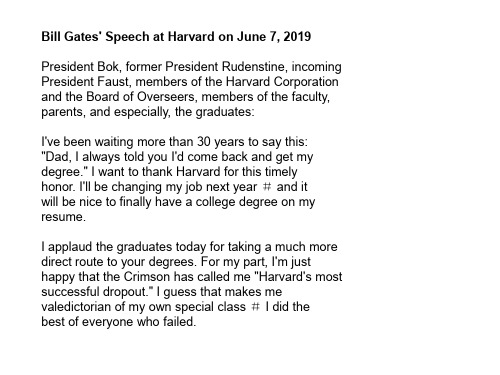
For Melinda and for me, the challenge is the same: how can we do the most good for the greatest number with the resources we have. During our discussions on this question, Melinda and I read an article about the millions of children who were dying every year in poor countries from diseases that we had long ago made harmless in this country. Measles, malaria, pneumonia, hepatitis B, yellow fever. One disease I had never even heard of, rotavirus, was killing half a million kids each year - none of them in the United States.
比尔盖茨哈佛演讲中英
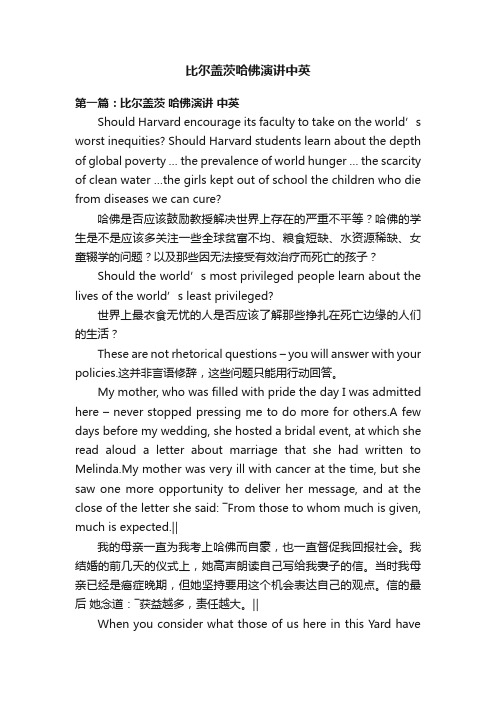
比尔盖茨哈佛演讲中英第一篇:比尔盖茨哈佛演讲中英Should Harvard encourage its faculty to take on the world’s worst inequities? Should Harvard students learn about the depth of global poverty … the prevalence of world hunger … the scarcity of clean water …the girls kept out of school the children who die from diseases we can cure?哈佛是否应该鼓励教授解决世界上存在的严重不平等?哈佛的学生是不是应该多关注一些全球贫富不均、粮食短缺、水资源稀缺、女童辍学的问题?以及那些因无法接受有效治疗而死亡的孩子?Should the world’s most privileged people learn about the lives of the world’s least privileged?世界上最衣食无忧的人是否应该了解那些挣扎在死亡边缘的人们的生活?These are not rhetorical questions – you will answer with your policies.这并非言语修辞,这些问题只能用行动回答。
My mother, who was filled with pride the day I was admitted here – never stopped pressing me to do more for others.A few days before my wedding, she hosted a bridal event, at which she read aloud a letter about marriage that she had written to Melinda.My mother was very ill with cancer at the time, but she saw one more opportunity to deliver her message, and at the close of the letter she said: ―From those to whom much is given, much is expected.‖我的母亲一直为我考上哈佛而自豪,也一直督促我回报社会。
比尔盖茨哈佛大学中英对照演讲稿
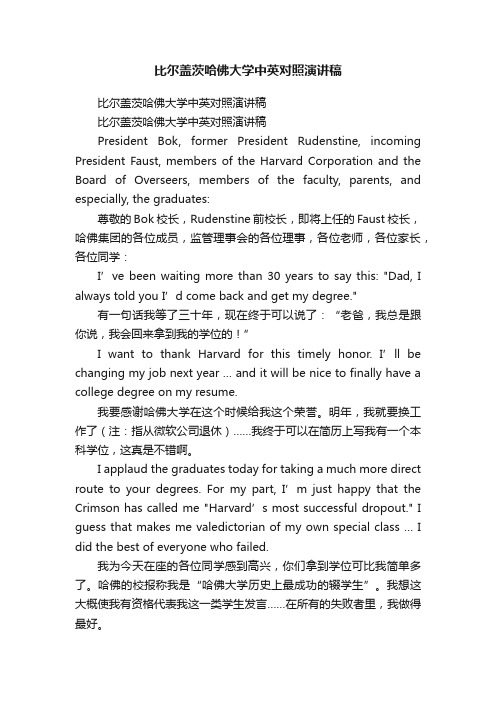
比尔盖茨哈佛大学中英对照演讲稿比尔盖茨哈佛大学中英对照演讲稿比尔盖茨哈佛大学中英对照演讲稿President Bok, former President Rudenstine, incoming President Faust, members of the Harvard Corporation and the Board of Overseers, members of the faculty, parents, and especially, the graduates:尊敬的Bok校长,Rudenstine前校长,即将上任的Faust校长,哈佛集团的各位成员,监管理事会的各位理事,各位老师,各位家长,各位同学:I’ve been waiting more than 30 years to say this: "Dad, I always told you I’d come back and get my degree."有一句话我等了三十年,现在终于可以说了:“老爸,我总是跟你说,我会回来拿到我的学位的!”I want to thank Harvard for this timely honor. I’ll be changing my job next year … and it will be nice to finally have a college degree on my resume.我要感谢哈佛大学在这个时候给我这个荣誉。
明年,我就要换工作了(注:指从微软公司退休)……我终于可以在简历上写我有一个本科学位,这真是不错啊。
I applaud the graduates today for taking a much more direct route to your degrees. For my part, I’m just happy that the Crimson has called me "Harvard’s most successful dropout." I guess that makes me valedictorian of my own special class (I)did the best of everyone who failed.我为今天在座的各位同学感到高兴,你们拿到学位可比我简单多了。
- 1、下载文档前请自行甄别文档内容的完整性,平台不提供额外的编辑、内容补充、找答案等附加服务。
- 2、"仅部分预览"的文档,不可在线预览部分如存在完整性等问题,可反馈申请退款(可完整预览的文档不适用该条件!)。
- 3、如文档侵犯您的权益,请联系客服反馈,我们会尽快为您处理(人工客服工作时间:9:00-18:30)。
Bill Gates: Harvard Commencement Speech1r I’ m pleased to present to you Dr. William Gates.Thank you. President Bok, former President Rudenstine, incoming President Faust, members of the Harvard Corporation and the Board of Overseers, members of the faculty, parents, and especially, the graduates:I've been waiting more than 30 years to say this: "Dad, I always told you I'd come back and get my degree."I want to thank Harvard for this honor. I'll be changing my job next year … and it will be nice to finally have a college degree on my resume.I applaud the graduates today for taking a much more direct route to your degrees. For my part, I'm just happy that the 2has called me "Harvard's most successful dropout." I guess that makes me 3of my own special cla ss … I did the best of everyone who failed.But I also want to be recognized as the guy who got Steve Ballmer to drop out of business school. I'm a bad influence. That's why I was invited to speak at your graduation. If I had spoken at your orientation, fewer of you might be here today.45House. There were always lots of people in my dorm room late at night discussing things, because everyone knew that I didn't worry about getting up in the morning. That's how I came to be the leader of 6Radcliffe was a great place to live. There were more women up there, and most of the guys were math-science types. That combination offered me the best odds, if youknow what I mean. This is where I learned the sad lesson that improving your odds doesn't guarantee success.One of my biggest memories of Harvard came in January 1975, when I made a call from Currier House 7that had begun making the world's first personal computers. I offered to sell them software.I worried that they would realize I was just a student in a dorm and hang up on me. Instead they said: 1母校2Crimson ['krimzn] n. 深红色这里指哈佛大学学生校报3valedictorian [.vælidik'tɔ:riən] n. 致告别辞者 , 告别演说者4phenomenal [fi'nɔminl] exceedingly or unbelievably great 同义词:fantastic 很棒的5Currier ['kʌri ə; 'kɜ:r-]6validate ['vælideit] vt. 使 ... 有效 , 确认, 宣布有效 declare or make legally valid7Albuquerque ['ælbək ə:ki] n. 1. 阿尔布开克 (美国新墨西哥州中部一城市 ;"We're not quite ready, come see us in a month," which was a good thing, because we hadn't written theWhat I remember above all about Harvard was being in the midst of so much energy and intelligence. It could be exhilarating, intimidating, sometimes even discouraging, but always challenging.– and though I left early, I was transformed by my years at Harvard, the friendships I made, and the ideas I worked on..8in the world – 9 10advances being made in the sciences.But humanity's greatest advances are not in its discoveries – but in how those discoveries are applied to reduce inequity. Whether through democracy, strong public education, quality health care, or broad economic opportunity –here in this country. And I knew nothing about the millions of people living in unspeakable poverty and disease in developing countries.It took me decades to find out.You graduates came to Harvard at a different time. You know more about the world's inequities than the classes that came before. In your years here, I hope you've had a chance to think about how ––donate to a cause – and you wanted to spend that time and money where it wouldFor Melinda and for me, the challenge is the same: how can we do the most good for the greatest number with the resources we have.During our discussions on this question, Melinda and I read an article about the millions of children who were dying every year in poor countries from diseases that we had long ago made harmless in this8inequity [in'ekwiti] n. 不公平 , 不公正9disparity [dis'pæriti] n. 不一致,差距,不平等10condemn [kən'dem] v. compel or force into a particular state or activity 被迫处于某种状态111213B, yellow fever. One disease I had never heard of, 14, was killing half a million kids each year – none of them in the United States.We were shocked. We had just assumed that if millions of children were dying and they could be saved, 15So we began our work in the same way anyone here would begin it. We asked: "How could the world let these children die?"The answer is simple, and harsh. The market did not reward saving the lives of these children, and governments did not subsidize it. So the children died because their mothers and their fathers had no power in the market and no voice in the system.But you and I have both.We can make market forces work better for the poor if we can develop a more creative capitalism – ifopen-ended. It can never be finished. But a conscious effort to answer this challenge can change the world.I am optimistic that we can do this, but I talk to skeptics who claim there is no hope. They say: "Inequity has been with us since the beginning, and will be with us till the end –because people just … don't … car e." I completely disagree.yet we did nothing – not because we didn't care, but because we didn't know what to do. If we had known how to help, we would have acted.11measles ['mi:zlz] n. 麻疹12malaria [mə'l ɛəri ə] n. 疟疾13hepatitis [.hepə'taitis] n. 肝炎14rotavirus ['rəʊt ə.vai ər əs] n.轮状病毒 (一种致婴儿胃肠炎的病毒15revolting [ri'vəultiŋ] adj. 讨厌的To turn caring into action, we need to see a problem, see a solution, and see the impact. But complexity blocks all three steps.1617to get peoplefrom preventable causes, one half of one percent of them were on this plane. We're determined to do everything possible to solve the problem that took the lives of the one half of one percent."The bigger problem is not the plane crash, but the millions of preventable deaths.We don't read much about these deaths. The media covers what's new – and millions of people dying is nothing new. So it stays in the background, where it's easier to ignore. But even when we do see it orso complex that we don't know how to help. And so we look away.If we can really see a problem, which is the first step, we come to the second step: cutting through the complexity to find a solution.— and makes it hard for their caring to matter.the highest-impact approach, deliver the technology ideal for that approach, and in the meantime, use the best application of the technology you already have — 18, like a 19.16advent ['ædvənt] n. 出现 , 到来17enterprise ['entəpraiz] 有意识的努力,决心18sophisticated [sə'fistikeitid] adj. 复杂的,精密的19蚊帐。
